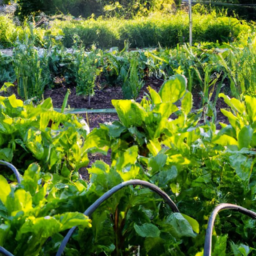There are many different gardening techniques out there, from hydroponics to companion planting. But have you heard of electroculture gardening? This fascinating technique involves using electricity to stimulate plant growth, and it's gaining popularity among farmers and gardeners around the world.
Imagine boosting your garden's growth by a staggering 100 to 300%! That's precisely what TikToker @hannahs.herbs is attempting with her electroculture garden. By running a low voltage electrical current through her plants' soil, she hopes to stimulate their growth and improve their health.
The concept of electroculture gardening is not new. In fact, it dates back to the 19th century when a handful of scientists were obsessed with the idea that electricity could be harnessed to make plants grow. Since then, numerous experiments have been conducted to test the theory, and the results have been promising.
Today, electroculture gardening is a growing field of study, with researchers around the world exploring its potential benefits. In China, for example, scientists are exposing lettuces and cucumbers to powerful electric fields in an attempt to make them grow faster and larger.
But how does electroculture gardening work? The idea is that by applying a low voltage electrical current to the soil, you can stimulate the growth of beneficial microbes and fungi that help plants absorb nutrients. At the same time, the electrical current can also stimulate the plant's own growth hormones, leading to stronger, healthier plants.
Of course, electroculture gardening is not without its skeptics. Some experts argue that the benefits of this technique are overstated and that there is not enough evidence to support its widespread use. Others worry about the potential risks of using electricity in the garden, including electrocution and fire hazards.
Despite these concerns, electroculture gardening continues to gain popularity, especially among organic and sustainable farmers. By harnessing the power of electricity, they hope to improve their crop yields and reduce their reliance on harmful chemicals and fertilizers.
If you're interested in trying electroculture gardening for yourself, there are a few things you'll need to get started. First, you'll need a low voltage electrical source, such as a battery or solar panel. You'll also need to invest in high-quality soil and plants, as well as a reliable moisture meter to ensure that your plants are getting the right amount of water.
Finally, it's important to remember that electroculture gardening is not a magic bullet. While it may help improve the health and growth of your plants, it's still important to follow basic gardening principles, such as proper watering and fertilization, to ensure the best results.
In conclusion, electroculture gardening is a fascinating and promising technique that is worth exploring if you're looking to improve your garden's growth and health. Whether you're a seasoned gardener or just starting out, there's no denying the potential benefits of this innovative approach to plant care.
